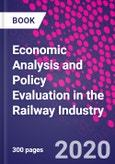Economic Analysis and Policy Evaluation in the Railway Industry: An International Perspective provides a systematic treatment of key metrics of modern railway systems. Contributors evaluate the economic effects of forces shaping railway and transportation industries worldwide, summarizing the ways that sophisticated railway systems differ from those plagued by problems and difficulties. Economic concepts, techniques and applied empirical models reveal vertical and horizontal differences among operations, enabling readers to draw conclusions about the economic implications of regulatory and policy initiatives. Each contributor describes opportunities for future research.
- Assesses the economics of restructuring, competition policy, pricing and investments
- Provides new economic models, data and problems
- Illuminates the opportunities and risks of various regulatory policies
Table of Contents
1. Introduction2. Evolution of the Sector in the Last 30 Years
3. The reforms to debate
4. Analysis of the Evolution of Productivity and Efficiency in the Railway Sector
5. Socio-Economic Evaluation of Rail Infrastructure Investments
6. External Competition and Relationship with other Modes
7. Pricing in Rail Transport
8. Future Challenges in Rail Transport








